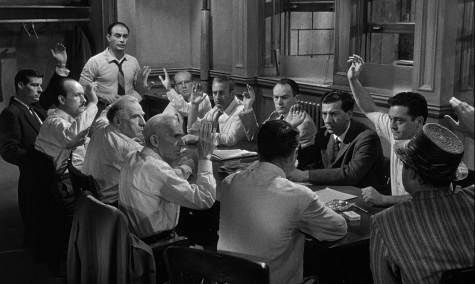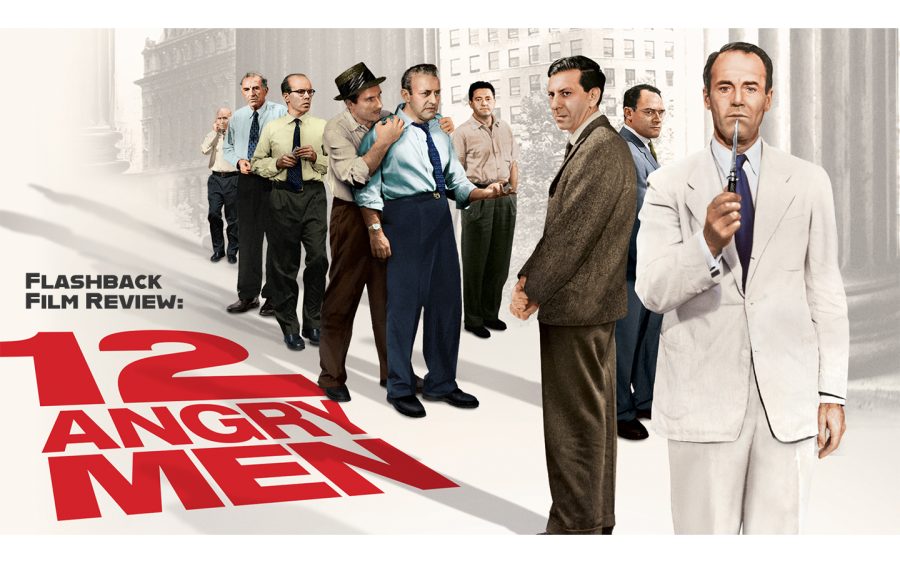A unanimous masterpiece (or) a daring dozen debate
Rediscover the classic film regarding a logical debate in a life or death situation
April 26, 2023
12 Angry Men
Genre: Crime and Drama
Debuted: April 10, 1957
Runtime: 1 hr 36 mins
Rating: ✭✭✭✭✭✭✭✭✭✭✭ (10/10)
“12 Angry Men” is a film directed by Sidney Lumet based on the television play written by Reginald Rose about how a jury consisting of 12 gentlemen determine the fate of a young man accused of murder. The story follows the discussion between these 12 unique individuals with different opinions that must reach an unanimous conclusion of guilty or not guilty. As the intrigue deepens and tensions rise, it becomes a heated debate that will ultimately decide the execution or acquittal of this young man.
When it comes to the main strengths of this film, the acting and cinematography are stellar with astounding performances from actors such as Henry Fonda, Lee J. Cobb, E.G. Marshall and others. A little went a long way in this movie, which is still as impressive in the current film industry. The movie almost entirely takes place in a single room as one continuous yet fluid scene as the jurors discuss their arguments. There is very little music and when there is, it is a subtle score; going great lengths to entertain the audience.

The entirety of the narrative is explained through word of mouth with brilliant contextual hints that describe how the trial was conducted. Background information is established early on as characters are quickly introduced and the story begins, wasting very little time in a very casual way.
The main premise revolves around Juror number eight being the only man who doubts that the suspect accused is guilty, even when all 11 other jurors believe the suspect guilty. It then follows how Juror eight along with other Jurors analyze the evidence and logic presented in the trial and how eventually people begin to change their mind and agree with Juror eight.
One of the brilliant things about this film is how easy it is to determine the nature of each of these characters without directly introducing them. Throughout the film, their arguments and actions begin to describe their personality and their motives. For instance, Juror seven, a charismatic, witty individual, begins to show how little he truly cares about the trial as he only does what he believes will quickly finish the debate. Juror three, a stoic and rigid man, is revealed to have more personal motives behind his argument as he slowly shows how his emotions are clouding his judgment.
Ironically the strongest moments in this film consisting of a discussion, is the few moments when they are silent. As the movie is mostly about talking, those few moments of silence hit that much harder and bring a surprising amount of tension to a relatively calm film. This is also where the acting is at its peak as the minor movements and expressions each actor makes conveys their thoughts and emotions extremely well. The cinematography aids in this with particular shots of characters from varying angles to emphasize what is happening to an excellent effect.
The message of this movie, however, is not whether the subject is guilty or not. In reality it is about the importance of human life. When it comes down to determining whether someone should live or die, it is important to analyze every detail with pinpoint accuracy to determine what is the right course of action.
Another message this movie promotes is that sometimes people are too stubborn or simply do not care enough to search for the best answer. Of course, this movie is not going to be for everyone. Compared to other movies, it has no action scenes or visual spectacles as it entirely revolves around 12 frustrated jurors trying to come to a unanimous agreement.
Anyone who enjoys the subject of logical reasoning and debates will adore this film as it is a masterpiece in its field.









